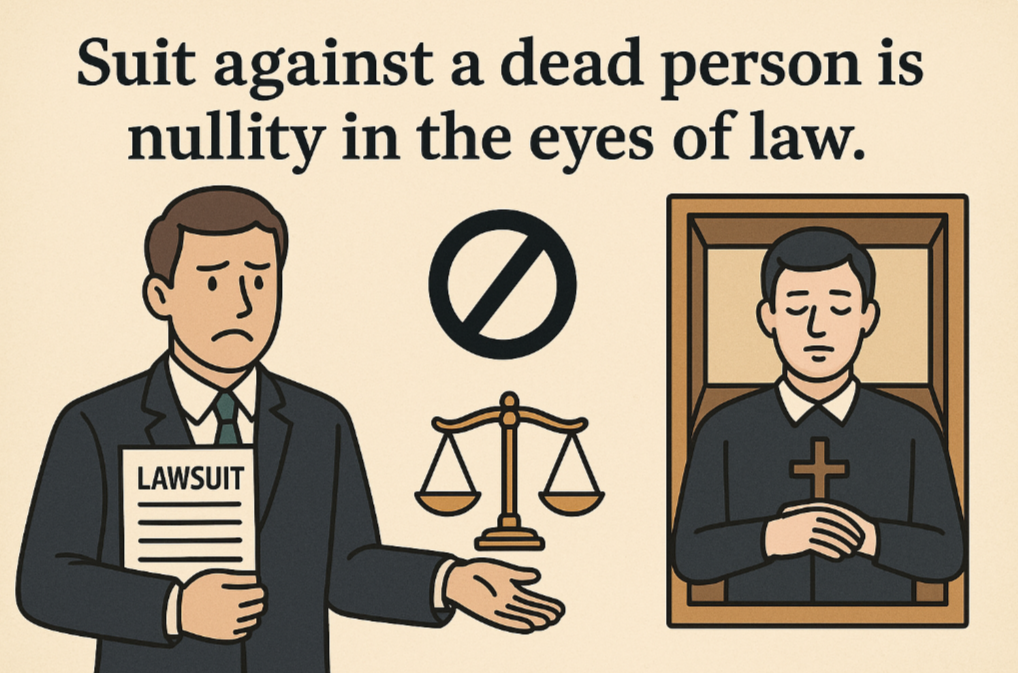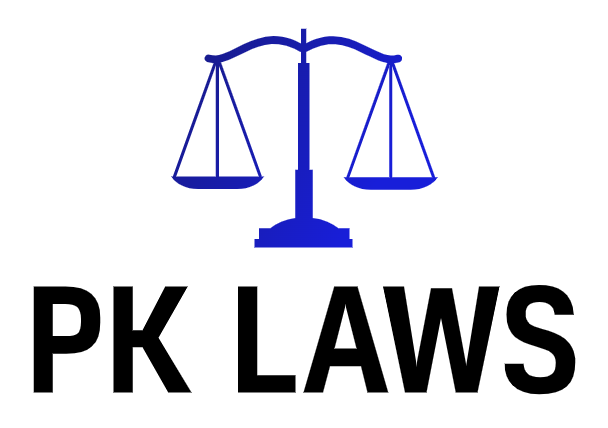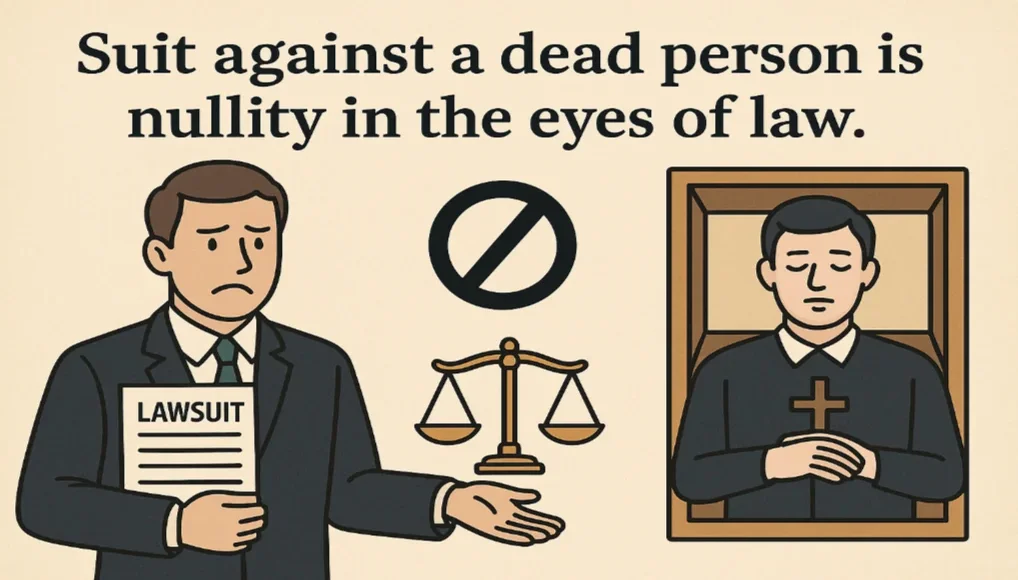In the legal jurisprudence of Pakistan and India, it is a well-settled principle that a civil suit filed against a person who was already dead at the time of its institution is a nullity in the eyes of law. The courts regard such a suit as stillborn, incapable of being revived through the inclusion of the deceased’s legal heirs. However, there are exceptions and nuances, particularly when there are multiple defendants. This article examines the legal position through statutory provisions and case law precedents, including judgments from the Supreme Court and High Courts of Pakistan.
Suit Against Sole Dead Person / Defendant
When a suit is instituted only against a single person who was already deceased, it is treated as non-existent from its inception. Such a suit:
- Has no legal standing
- Is not merely defective — it is void and incapable of being cured
- Cannot be revived by substituting the legal heirs
This position is clearly supported by judicial pronouncements, including the landmark case:
PLD 2009 SC 183 — Authored by Justice Tassaduq Hussain Jillani and Justice Sheikh Hakim Ali, the Supreme Court held that Order I Rules 3, 9 & 10, when read with Section 27 of the Civil Procedure Code (CPC), imply that a civil suit must be instituted against persons who are alive and amenable to the court’s jurisdiction. A suit against a dead person is non est in the eyes of law.
Further reliance can be placed on:
- 2013 SCMR 464 — A suit filed against Muhammad Yar (already deceased) was declared stillborn and uncurable.
- Hafiz Brothers (Pvt.) Ltd. v. Pakistan Industrial credit and investment corporation limited (2001 SCMR 1) — A suit against a dead person was held to be a nullity and incapable of continuation.

Remedy for the Plaintiff
Where the only defendant is found to have already passed away before the institution of the suit, the plaintiff’s only legal recourse is to withdraw the suit and, if so advised, institute a fresh suit against the legal heirs of the deceased on the basis of the same cause of action. However, this remedy is subject to the law of limitation, which means the fresh suit must be filed within the legally prescribed time period. The courts have consistently held that no amendment or substitution of legal heirs is permissible in such cases, as the original suit was void ab initio and lacked legal existence from the outset.
Why Can’t You Sue Someone Who Has Died?
Think of it this way: a court case is a fight between two sides. The court listens to both parties, looks at the evidence, and then makes a decision.
Dead Persons Cannot Defend Themselves: A person who has died cannot hire a lawyer, cannot tell their side of the story, and cannot present evidence in their defense. It is fundamentally unfair for a case to proceed without the other side being able to speak. The core principle of justice is to hear both sides (audi alteram partem).
Legal Personality Ends at Death: In the eyes of the law, a person’s rights and responsibilities exist only while he is alive. When they die, their “legal personality” ceases to exist. You can’t file a case against someone who is not recognized as a legal entity anymore.
So, who is responsible for the dead person’s affairs? The answer is their legal heirs (like their children or spouse) or the executor of their will. These people are now in charge of the property and debts left behind by the deceased.
Exceptions to the Rule That the Suit against Dead is Nullity
One of Multiple Defendants is Deceased
The strict rule of nullity is not applicable when a suit is filed against multiple defendants and only one of them was dead at the time of filing. In such cases:
- The suit remains valid against the living defendants
- The defect with regard to the deceased defendant is curable
- The plaintiff can bring the legal heirs of the deceased on record through Order XXII CPC
If the Defendant Dies During the Case
The rule is strictest when the person was already dead before the case was filed. If the defendant dies after the case has already started, the situation is different. In this case, the case does not become a nullity. Instead, the plaintiff must apply to the court to bring the legal heirs into the case within certain period. After impleading of legal heirs of deceased, the suit would proceed further.
Case Law Supporting This Exception
- PLD 2003 Lahore 615 — Malik Bashir Ahmed Khan v. Qasim Ali & 12 others
The Lahore High Court ruled that nullity applies only to the part of the suit concerning the deceased defendant, not the entire suit when multiple defendants are involved - AIR 1926 Lahore 153 — Prim Pala Mul-Narain Mal v. Fauja Singh
Recognized the suit as valid against living co-defendants despite one defendant being deceased - Hafiz Brothers case (supra)
Further confirms that substitution is permissible only if the deceased defendant was part of a larger group of defendants
Relevant Statutory Provisions: Code of Civil Procedure, 1908
Section 27 CPC
Provides for issuance of summons to defendants — assumes that the defendant is a living person capable of receiving process.
Order I Rule 3 CPC
Provides for who may be joined as defendants — must be persons against whom a right to relief exists at the time of institution.
Order I Rule 9 CPC
Non-joinder or misjoinder does not defeat a suit unless the person was non-existent at the time of institution.
Order I Rule 10 CPC
Allows courts to strike out or add parties — but only where a suit is validly instituted.
Legal Maxims and Interpretation
This rule is aligned with the Latin legal maxim:
Actio personalis moritur cum persona
A personal right of action dies with the person.
It reflects the foundational requirement that a civil court has no jurisdiction over a non-existent party.
Conclusion
The Pakistani legal system draws a clear distinction between suits instituted against already deceased persons and those who die during proceedings. While the former renders the suit a nullity ab initio, the latter allows for legal heirs to be substituted. Where there are multiple defendants, only the portion of the suit concerning the dead party becomes defective and not the entire case. These legal safeguards ensure proper administration of justice while maintaining procedural integrity.

